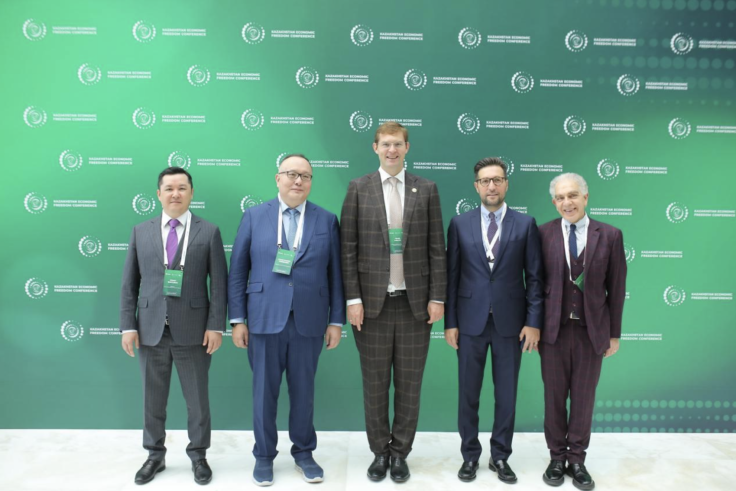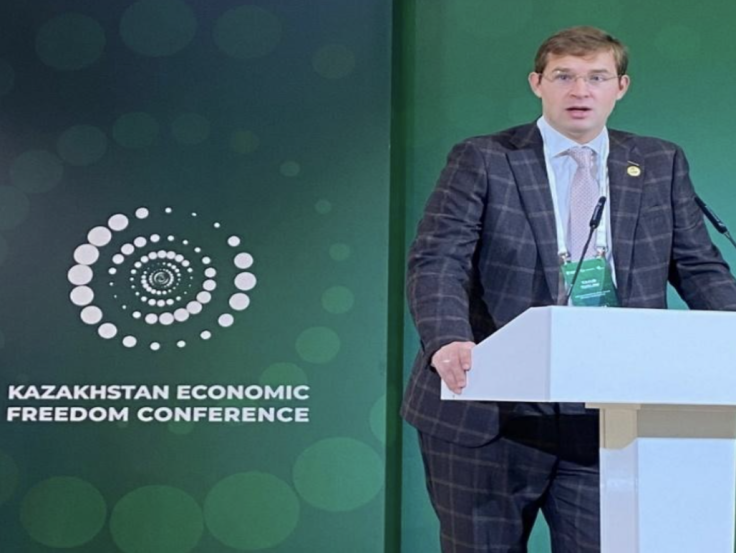Kazakhstan Positioned as a Central Asian Economic Powerhouse: Insights from the Kazakhstan Economic Freedom Conference

Kicking off this week, the Kazakhstan Economic Freedom High-Level Conference has brought together top policymakers, academics, and financial experts to discuss the shifting dynamics of the global economy.
Among the highlights of the event was a panel discussion led by Timur Turlov, CEO of Freedom Holding Corp., who stressed that Kazakhstan has a unique opportunity to become a central hub for Central Asian countries.
During the session on 'The Global Economy in a World of Global Shocks,' Turlov referenced President Tokayev's ambitious goal to double Kazakhstan's GDP, saying, "This goal is quite achievable if there is a focus on investing in human capital and if we can make capital accessible for talents, businesses, and neighbouring countries."
A key theme emerging from the conference has been the role of telecommunications and digital infrastructure in shaping Kazakhstan's economic future. The government's substantial investment in these areas has not only enhanced connectivity but also opened up new opportunities for businesses, particularly in fintech and digital finance.
These developments have positioned Kazakhstan to compete on a global scale, further integrating its economy into the wider international financial system.

Huseyin Ozhan, Acting Managing Director for Central Asia at the European Bank for Reconstruction and Development (EBRD), also made significant announcements, revealing that the EBRD has committed $17 billion to investments in the Central Asia region, with $10 billion allocated to Kazakhstan alone. He noted that 2024 is expected to set a record for investment volume in the region, highlighting Kazakhstan's unique advantage in accessing both eastern and western markets. According to Ozhan, "Kazakhstan holds a strategic position in shaping the global economic environment."
Building on these points, Turlov added, "While there are new challenges, there are also many new opportunities for countries like Kazakhstan. Advances in technology and AI allow Kazakhstan to compete globally, enabling those with talent to unlock their potential in a more inclusive way." His comments underscored how technology is transforming Kazakhstan's role in the global economy, particularly in light of the country's burgeoning financial markets and telecommunications sectors.
As the largest landlocked country in the world, Kazakhstan has emerged as a regional economic powerhouse, a status reinforced by the International Monetary Fund's (IMF) recent World Economic Outlook. The IMF projects Kazakhstan's GDP to surge to $354.7 billion by 2028, marking a 36.8% increase from 2023. This growth reflects the country's resilience, with its economy expanding by 5.1% in the first half of 2023, driven by strong exports and fiscal stimulus.
Kazakhstan's leadership in financial markets and telecommunications has also been instrumental in helping it weather global economic shocks while ensuring sustained development. The expansion of financial services, alongside investments in the Astana International Financial Centre (AIFC), has created a more dynamic and transparent market, attracting investors from across the globe.
Looking ahead, the government's forecast for 2025-2029, recently approved by Prime Minister Olzhas Bektenov, demonstrates a clear commitment to maintaining economic stability and fostering growth. Inflation is expected to decrease gradually, from 5.5-7.5% in 2025 to around 5% by 2029. Revenues are forecast at 21.7 trillion tenge (US$45.2 billion) in 2025, with a guaranteed transfer of 2 trillion tenge (US$4.2 billion) from the National Fund to stabilise the budget.
In support of small and medium-sized businesses, the government has allocated 204 billion tenge (US$424.7 million) to foster entrepreneurship, while 568 billion tenge (US$1.2 billion) will be invested in transport infrastructure, strengthening Kazakhstan's role as a logistics hub between Europe and Asia.
Kazakhstan's economic resilience and its continued investment in financial markets and telecommunications underscore its strategic importance in the region. As the country hosts this high-level conference, it is clear that Kazakhstan is positioning itself as a model of resilience and sustainable growth, emerging stronger from global uncertainties and setting a course for long-term success.
© Copyright IBTimes 2025. All rights reserved.





















